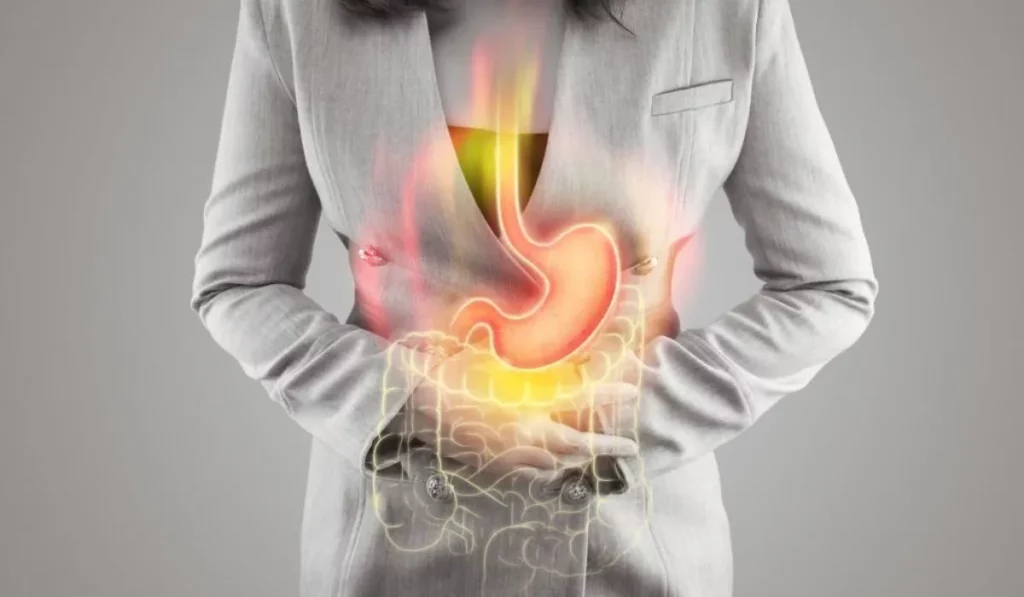Digestion is a crucial bodily function that allows us to break down food and absorb nutrients. When digestion is impaired, it can lead to unpleasant symptoms and health issues.
Poor digestion indicates that the digestive system is not working optimally to break down food and eliminate waste. The causes can range from eating habits to underlying medical conditions.
Being aware of the symptoms of poor digestion can help identify issues early and take steps to improve gut health.
What Are The Symptoms Of Poor Digestion?
There are various symptoms that can point to impaired digestion.

Here are some of the most common:
Bloating: A swollen or distended abdomen after eating meals can indicate poor digestion. Foods are not being adequately broken down.
Excessive Gas: Passing gas frequently or flatulence after meals, signals that food is fermenting in the intestines rather than being digested properly.
Heartburn: A painful, burning sensation in the chest or throat after eating is caused by stomach acid backing up into the esophagus. This symptom of acid reflux points to improper digestion.
Stomach Pain and Cramping: Digestive discomfort or pain in the abdomen that occurs frequently may be due to difficulty digesting foods. This can stem from enzyme deficiencies or gut motility issues.
Nausea: Persistent nausea after eating meals can indicate indigestion and improper breakdown of foods. This may also be accompanied by vomiting.
Diarrhea or Constipation: Frequent loose stools or difficulty passing stools suggest food is moving through the intestines too quickly or too slowly. This indicates poor digestion and absorption.
Food Intolerances: Experiencing symptoms like bloating, diarrhea or stomach pain after eating certain foods like dairy, gluten or fats can signal a weak digestive system.
Poor Digestion Causes
There are many possible causes for poor digestion:
Inadequate Chewing: Not chewing food thoroughly prevents proper breakdown by saliva which starts the digestion process.
Eating Too Much or Too Fast: Overeating and eating hurriedly overwhelms the digestive system making it difficult to function optimally.
High Stress Levels: Stress negatively impacts digestion by reducing blood flow and mobility in the intestines. This can limit the body’s ability to absorb nutrients.
Food Sensitivities: Gluten, dairy and other foods can irritate the digestive tract in those with sensitivities causing inflammation that impairs digestion.
Gut Inflammation: Conditions like IBS, Crohn’s disease, Celiac and ulcers cause inflammation that hampers digestion.
Insufficient Stomach Acid: Low stomach acid production makes it difficult to digest protein, kill off harmful bacteria and absorb key nutrients.
Pancreatic Enzyme Deficiency: The pancreas produces enzymes vital for breaking down fats, proteins and carbs. Insufficient enzymes disrupt digestion.
Small Intestinal Bacterial Overgrowth (SIBO): Excess bacteria in the small intestine compete for nutrients and impair digestion and absorption.
Medications: Antibiotics, antacids and other medications can negatively impact digestive function, gut bacteria balance and nutrient absorption.
How To Keep Your Digestive System Healthy
There are several ways to support good digestion and gut health:
Eat More Fiber: Insoluble and soluble fiber feeds good gut bacteria which benefits digestion. High fiber foods include vegetables, fruits, beans and whole grains.
Stay Hydrated: Drink adequate water and fluids like herbal tea to support digestive health. Dehydration can lead to constipation.
Manage Stress: Practice meditation, yoga and deep breathing to engage the relaxation response and support healthy digestion.
Chew Thoroughly: Take time to chew each bite around 25 times to aid digestion right from the start.
Take Probiotics: These healthy bacteria support intestinal health and improve digestion and immunity. Yogurt, kefir, sauerkraut and kimchi provide probiotics.
Incorporate Prebiotics: Prebiotics are fibers that feed probiotics and support the growth of beneficial bacteria. Sources include garlic, onions, bananas and oats.
Eat Fermented Foods: The natural probiotics in foods like yogurt, kimchi, kefir, sauerkraut and kombucha aid digestion.
Stay Active: Regular exercise stimulates the digestive tract and supports healthy function. Aim for 30 minutes daily.
Consider Supplements: Digestive enzymes, HCL supplements and bitters can provide added digestive support when needed.
Conclusion
Poor digestion can cause uncomfortable symptoms and negatively impact overall health. Being aware of common symptoms allows for a problem to be addressed early.
Digestion can be optimized through dietary and lifestyle measures like eating fiber, managing stress, exercising and taking targeted supplements. Supporting good digestion leads to improved gut health, immunity and wellbeing.
FAQ
Q1: What Symptoms Require Seeing a Doctor?
Symptoms like vomiting, bloody stools, severe cramping or weight loss require medical evaluation to check for underlying conditions.
Q2: What Foods Are Easy On Digestion?
Gentle foods like broth-based soups, boiled rice, cooked vegetables, lean meats, oatmeal and yogurt are typically easy to digest.
Q3: Are Digestive Issues Always Related To Diet?
No, conditions like IBS, SIBO, Crohn’s disease and Celiac are examples where impaired digestion is caused by other factors beyond diet. However, eating habits still play an important role in managing symptoms.
Q4: What Natural Remedies Help With Digestion?
Ginger, peppermint, chamomile and fennel teas can provide relief for digestion issues. Taking probiotic and enzyme supplements can also help improve digestion.

